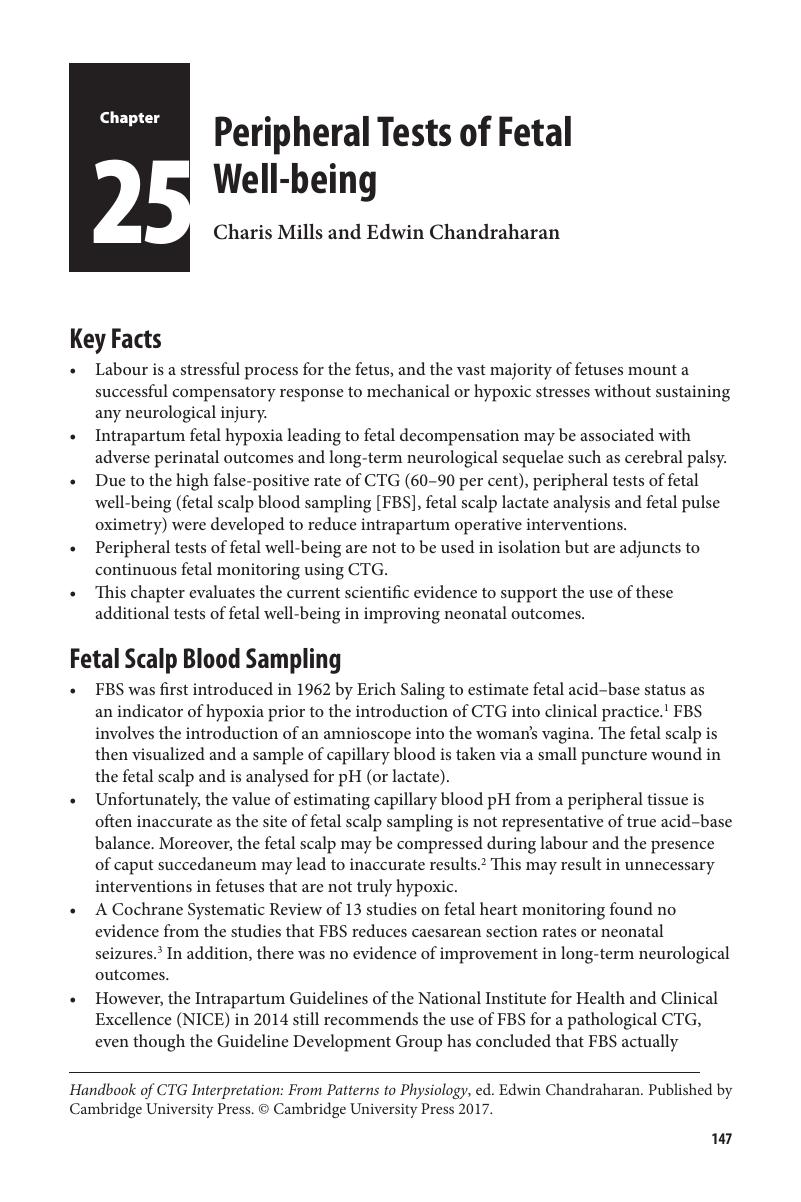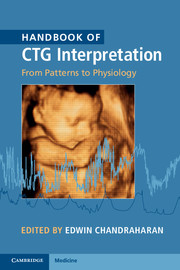Book contents
- Handbook of CTG Interpretation
- Handbook of CTG Interpretation
- Copyright page
- Dedication
- Contents
- Contributors
- Preface
- Acknowledgements
- Glossary
- 1 ‘An Eye Opener’: Perils of CTG Misinterpretation
- 2 Fetal Oxygenation
- 3 Physiology of Fetal Heart Rate Control and Types of Intrapartum Hypoxia
- 4 Understanding the CTG
- 5 Applying Fetal Physiology to Interpret CTG Traces
- 6 Avoiding Errors
- 7 Antenatal Cardiotocography
- 8 Intermittent (Intelligent) Auscultation in the Low-Risk Setting
- 9 Current Scientific Evidence on CTG
- 10 Role of Uterine Contractions and Intrapartum Reoxygenation Ratio
- 11 Intrapartum Monitoring of a Preterm Fetus
- 12 Role of Chorioamnionitis and Infection
- 13 Meconium
- 14 Intrapartum Bleeding
- 15 Labour with a Uterine Scar
- 16 Impact of Maternal Environment on Fetal Heart Rate
- 17 Use of CTG with Induction and Augmentation of Labour
- 18 Recognition of Chronic Hypoxia and the Preterminal Cardiotocograph
- 19 Unusual Fetal Heart Rate Patterns
- 20 Intrauterine Resuscitation
- 21 Management of Prolonged Decelerations and Bradycardia
- 22 ST-Analyser (STAN)
- 23 ST-Analyser
- 24 Role of a Computerized CTG
- 25 Peripheral Tests of Fetal Well-being
- 26 Operative Interventions for Fetal Compromise
- 27 Nonhypoxic Causes of CTG Changes
- 28 Neonatal Implications of Intrapartum Fetal Hypoxia
- 29 Role of the Anaesthetist in the Management of Fetal Compromise during Labour
- 30 Medico-legal Issues with CTG
- 31 Ensuring Competency in Intrapartum Fetal Monitoring
- 32 Physiology-Based CTG Training
- Appendix Rational Use of FIGO Guidelines in Clinical Practice
- Answers to Exercises
- Index
- References
25 - Peripheral Tests of Fetal Well-being
Published online by Cambridge University Press: 25 March 2017
- Handbook of CTG Interpretation
- Handbook of CTG Interpretation
- Copyright page
- Dedication
- Contents
- Contributors
- Preface
- Acknowledgements
- Glossary
- 1 ‘An Eye Opener’: Perils of CTG Misinterpretation
- 2 Fetal Oxygenation
- 3 Physiology of Fetal Heart Rate Control and Types of Intrapartum Hypoxia
- 4 Understanding the CTG
- 5 Applying Fetal Physiology to Interpret CTG Traces
- 6 Avoiding Errors
- 7 Antenatal Cardiotocography
- 8 Intermittent (Intelligent) Auscultation in the Low-Risk Setting
- 9 Current Scientific Evidence on CTG
- 10 Role of Uterine Contractions and Intrapartum Reoxygenation Ratio
- 11 Intrapartum Monitoring of a Preterm Fetus
- 12 Role of Chorioamnionitis and Infection
- 13 Meconium
- 14 Intrapartum Bleeding
- 15 Labour with a Uterine Scar
- 16 Impact of Maternal Environment on Fetal Heart Rate
- 17 Use of CTG with Induction and Augmentation of Labour
- 18 Recognition of Chronic Hypoxia and the Preterminal Cardiotocograph
- 19 Unusual Fetal Heart Rate Patterns
- 20 Intrauterine Resuscitation
- 21 Management of Prolonged Decelerations and Bradycardia
- 22 ST-Analyser (STAN)
- 23 ST-Analyser
- 24 Role of a Computerized CTG
- 25 Peripheral Tests of Fetal Well-being
- 26 Operative Interventions for Fetal Compromise
- 27 Nonhypoxic Causes of CTG Changes
- 28 Neonatal Implications of Intrapartum Fetal Hypoxia
- 29 Role of the Anaesthetist in the Management of Fetal Compromise during Labour
- 30 Medico-legal Issues with CTG
- 31 Ensuring Competency in Intrapartum Fetal Monitoring
- 32 Physiology-Based CTG Training
- Appendix Rational Use of FIGO Guidelines in Clinical Practice
- Answers to Exercises
- Index
- References
Summary

- Type
- Chapter
- Information
- Handbook of CTG InterpretationFrom Patterns to Physiology, pp. 147 - 150Publisher: Cambridge University PressPrint publication year: 2017



